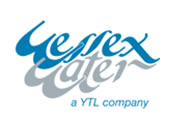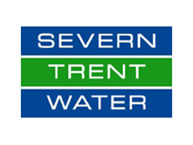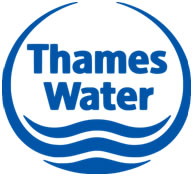Water Softeners 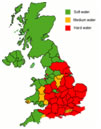
As you can see from the map our local area has particulary hard water.
This can be seen in the kettle, on taps, sinks, shower heads and screens, and in toilets. Washing machine's and dishwashers also suffer from hard water, causing more maintainance call outs and less efficient use of detergents. By having a water softener you can typically reduce your detergent use by more than 50% and also recieve better cleaning results.
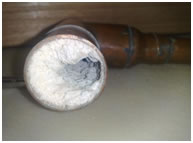 Now imagine the problems that the hard water is causing to the parts of your home's plumbing system that you dont see. Hot water heating efficiency will drop dramatically with hard water lime deposits.
Now imagine the problems that the hard water is causing to the parts of your home's plumbing system that you dont see. Hot water heating efficiency will drop dramatically with hard water lime deposits.
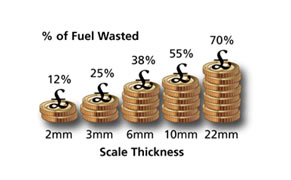 After a few years of hard water the heating element of a hot water cylinder will be 25% less efficient. This makes the boiler or electrical element work much harder wasting a huge amount of fuel.
After a few years of hard water the heating element of a hot water cylinder will be 25% less efficient. This makes the boiler or electrical element work much harder wasting a huge amount of fuel.
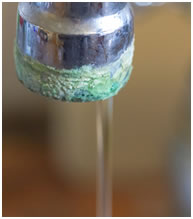 Scum forms when soap mixes with hard water causing discoloration of the water making it look milky. When this dries and is mixed with the lime scale deposits it is stubborn to remove. Cleaning these scum deposits often requires additional cleaning products and a lot of hard work. These scum deposit are also left on your skin after showering or bathing causing Eczema and Psoriasis sufferers increased aggravation of their condition.
Scum forms when soap mixes with hard water causing discoloration of the water making it look milky. When this dries and is mixed with the lime scale deposits it is stubborn to remove. Cleaning these scum deposits often requires additional cleaning products and a lot of hard work. These scum deposit are also left on your skin after showering or bathing causing Eczema and Psoriasis sufferers increased aggravation of their condition.
Washing laundry in hard water areas will cause soap scum to attach to the fibres in the linens, towel, and clothes that you wash. Dirt that you were trying to wash away sticks to these fibres making the laundry look dull and whites grey in colour. Hard water washing will damage these fibres, causing a reduction in the life of the laundry.
You will use excessive soap Inside the washing machine before you get any lather. This soap scum and grime builds up and over time the waste and drainage will form grey lumps leading to blockages. A major cause of repair call outs!
So what is water hardness?
Hard water contains dissolved minerals, Calcium and Magnesium salts. Hard water occurs where the geology in the ground has these elements present. As rain passes through and over these minerals small amounts are dissolved by the water. Pure water will contain no measure of hardness. The measurement of water hardness is measured by various different scales, mg/l (or parts per million – ppm) is today a more commonly quoted measurement. The higher the concentration of Calcium and Magnesium salts result in a higher level of water hardness.
There are two types of water hardness, Permanent hardness and Temporary hardness. The mix and type of Permanent and Temporary hardness depend on the type of salts that are present.
Permanent hardness will contain Sulphates of calcium and magnesium. These will remain soluble in the water even when heated or boiled, affecting how the soap behaves.
Temporary hardness will usually contain dissolved calcium carbonate. These cause a formation of lime scale that is whitish in colour where water is heated or boiled. The build up that you see in kettles and hot water heating systems.
Hard water classifcation
Soft water 0 to 60 mg/l;
Moderately hard water 60 to 120 mg/l;
Hard water 120 to 200 mg/l
Very hard water above 200 mg/l.
To check how hard your water is click your water supplier below.
Click to return to top of page.

